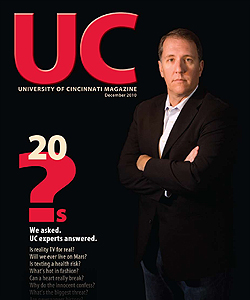False Confessions: Why do the innocent confess?
It's a difficult idea to wrap your mind around: Why would suspects confess to crimes they didn't commit?
For UC law professor Mark Godsey, answering that question has become part of his life's work as director of the Ohio Innocence Project, an effort to help free wrongly convicted prisoners, some of whom claim they falsely confessed to crimes. To date, the project has released 10 innocent people from prison, with seven of them exonerated, based on DNA evidence.
Godsey says there are several key reasons why false confessions happen. "First, there are vulnerable groups, like juveniles and people with mental illnesses," he says. "I think it's sort of self-explanatory that someone who is 13 years old is going to be extremely impressionable, want to please the police and be easily intimidated. It's the same with someone who has a mental handicap of some kind."
A number of psychological studies on different personality types have also revealed that certain individuals, even adults with no mental handicaps, are geared toward pleasing at nearly any cost. "They get in a situation where they are being interrogated for hours and hours, and it's clear the police are desperate," Godsey says. "These are the types of people who will eventually agree to anything."
Another category, he notes, are suspects who become convinced by their attorneys or interrogators that even though they didn't commit a crime, they are going to be convicted.
"If I'm 99 percent certain I'm going to be convicted and get the death penalty, the logical choice becomes admitting to something I didn't do and taking 30 years in prison instead," Godsey says. "Some people will succumb to the pressure."
An additional factor in creating false confessions is that under the law, police are allowed to lie to suspects. For instance, an interrogator might pose a fake phone call to the interrogation room, telling the suspect that their DNA was found at a crime scene. "They do that all the time," Godsey says.
"The cops will tell suspects, ‘We got your fingerprints; you're screwed buddy. You're going to go to the electric chair. Your only opportunity for you to tell your story is right now. I'll walk out of here and tell them it was self-defense, and I'll cut you a good deal with the prosecutor, but this is the last chance I'm giving you.'"
Awareness of these issues is the first step toward reducing the number of false confessions, he says. Indirectly, DNA evidence has spawned a whole area of research that has demonstrated the need to videotape interrogations, allowing experts in such cases to watch the tapes for earmarks of a false confession, including leading or suspect interrogation techniques.
In fact, the work of Godsey and UC law students through the Ohio Innocence Project paid off last April when Ohio Gov. Ted Strickland signed into law Senate Bill 77, which sets statewide standards for retaining biological evidence, requires the taking of DNA in felony arrests and calls for new procedures for police lineups. The law also requires videotaped interrogations in murder, rape and other serious cases.
"That will cut down on false confessions," Godsey says. "Innocent suspects may still confess, but at least we'll have a record of it."
Link:
Ohio Innocence Project website

 Issue Archive
Issue Archive
